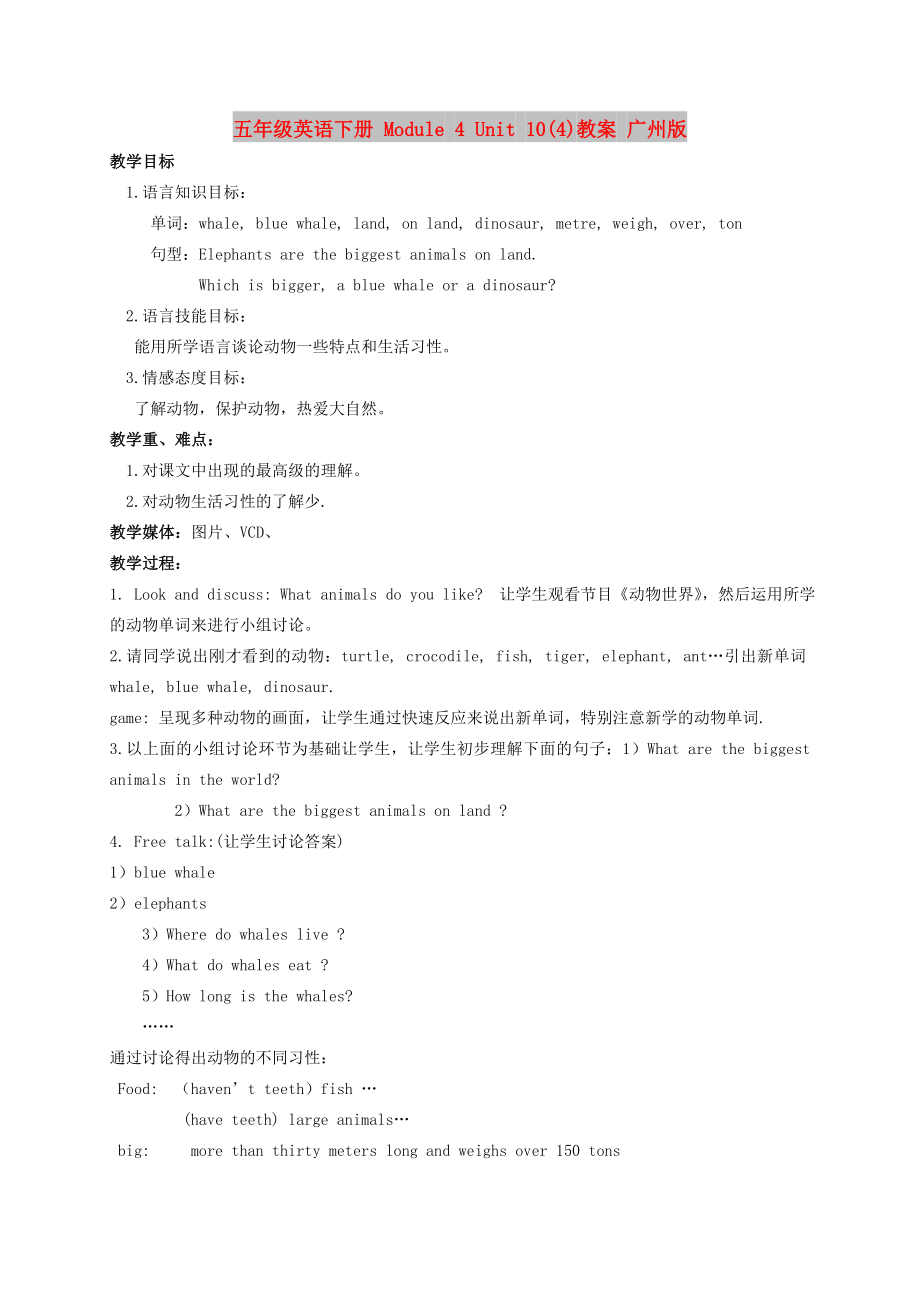《五年級(jí)英語下冊(cè) Module 4 Unit 10(4)教案 廣州版》由會(huì)員分享�����,可在線閱讀����,更多相關(guān)《五年級(jí)英語下冊(cè) Module 4 Unit 10(4)教案 廣州版(5頁(yè)珍藏版)》請(qǐng)?jiān)谘b配圖網(wǎng)上搜索。
1�����、五年級(jí)英語下冊(cè) Module 4 Unit 10(4)教案 廣州版
教學(xué)目標(biāo)
1.語言知識(shí)目標(biāo):
單詞:whale, blue whale, land, on land, dinosaur, metre, weigh, over, ton
句型:Elephants are the biggest animals on land.
Which is bigger, a blue whale or a dinosaur?
2.語言技能目標(biāo):
能用所學(xué)語言談?wù)搫?dòng)物一些特點(diǎn)和生活習(xí)性。
3.情感態(tài)度目標(biāo):
了解動(dòng)物�,保
2、護(hù)動(dòng)物�,熱愛大自然。
教學(xué)重����、難點(diǎn):
1.對(duì)課文中出現(xiàn)的最高級(jí)的理解。
2.對(duì)動(dòng)物生活習(xí)性的了解少.
教學(xué)媒體:圖片�、VCD、
教學(xué)過程:
1. Look and discuss: What animals do you like? 讓學(xué)生觀看節(jié)目《動(dòng)物世界》����,然后運(yùn)用所學(xué)的動(dòng)物單詞來進(jìn)行小組討論。
2.請(qǐng)同學(xué)說出剛才看到的動(dòng)物:turtle, crocodile, fish, tiger, elephant, ant…引出新單詞whale, blue whale, dinosaur.
game: 呈現(xiàn)多種動(dòng)物的畫面��,讓學(xué)生通過快速反應(yīng)來說出新單詞�����,特別注意新學(xué)的動(dòng)物
3����、單詞.
3.以上面的小組討論環(huán)節(jié)為基礎(chǔ)讓學(xué)生,讓學(xué)生初步理解下面的句子:1)What are the biggest animals in the world?
2)What are the biggest animals on land ?
4. Free talk:(讓學(xué)生討論答案)
1)blue whale
2)elephants
3)Where do whales live ?
4)What do whales eat ?
5)How long is the whales?
……
通過討論得出動(dòng)物的不同習(xí)性:
F
4���、ood: (haven’t teeth)fish …
(have teeth) large animals…
big: more than thirty meters long and weighs over 150 tons
live: in the sea
5. 學(xué)習(xí)新呈現(xiàn)的單詞:land ,on land, meter, weigh, over ,ton 注意單詞的發(fā)音規(guī)律
呈現(xiàn)課文和跟讀
Make a survey and fill in the form.
Animal
Live
Food
Long
Weigh
……
5�、
Unit 10 What are the biggest animals in the world?
Work With Language(第二課時(shí))
教學(xué)目標(biāo):
1.語言知識(shí):
I’m…than you. I’m…than you two. I’m the…of the three.
I think this picture is the best.
2.語言技能
能在較簡(jiǎn)單的句型中正確理解及運(yùn)用形容詞、副詞的比較級(jí)和最高級(jí)��。
能在情景中進(jìn)一步理解
6��、及運(yùn)用最高級(jí)進(jìn)行語言交際�����。
教學(xué)重難點(diǎn):
重點(diǎn):比較級(jí)�����、最高級(jí)的理解和運(yùn)用�。
難點(diǎn):最高級(jí)的理解和正確運(yùn)用���。
教學(xué)過程:
1. Leading-in
Play a game and chant: 讓學(xué)生看一些動(dòng)物的剪影30秒鐘(在書本), 然后拿開���,采用chant的形式來復(fù)習(xí)動(dòng)物單詞和最高級(jí),如:
Which animal is the biggest on land? Elephant, elephant,
Which animal is the biggest in the world? Blue whale, blue whale,
2. Presentation a
7���、nd Practice
1) Free talk
教師利用本班學(xué)生及課室的真實(shí)情景,談話引出形容詞�、副詞的比較級(jí)和最高級(jí),目的是讓學(xué)生在真實(shí)的情景中去理解最高級(jí)的用法并進(jìn)行初步運(yùn)用�����。
形容詞:
T: Is A tall? (叫學(xué)生A站到課室前面)
Ps: Yes.
T: Who is taller, A or B? (叫個(gè)子稍微高點(diǎn)的學(xué)生B站到A旁邊)
Ps: B is taller.
T: What about C? (叫個(gè)子比學(xué)生B高的C站在一起)
Ps: C is the tallest. (學(xué)生可能這樣回答或回答其他)
T: (給予引導(dǎo)并呈現(xiàn)新的內(nèi)容) A
8���、is tall, B is taller than A, C is taller than A and B, So C is the tallest of the three.
副詞:
T: Does he jump high?
(教師叫三名學(xué)生進(jìn)行跳高的比賽�,引出副詞的最高級(jí)的用法)
2)group discussion:
找優(yōu)點(diǎn): 讓學(xué)生在小組里面討論找出自己比其他同學(xué)強(qiáng)的地方,并就小組里面討論的結(jié)果進(jìn)行匯報(bào)并寫下來.
E.g. I study English better than …
…runs fastest in our group.
…is str
9��、onger than…
Talk about the pictures and fill in the blank.(呈現(xiàn)課本P47 1的內(nèi)容)
3. Development:
Make an Animal Cartoon Picture Show. Make a survey and fill in the form(P47 2)(課前叫學(xué)生先畫好畫)
4. Summing up
回顧及總結(jié)本節(jié)課所學(xué)內(nèi)容���。
附送:
2019-2020年五年級(jí)英語下冊(cè) Module 4 Unit 10(5)教案 廣州版
一���、 Teaching Content:Module 4(Unit
10、 10) What are the biggest animals in the world?
二�����、Teaching aim:
(一) Main Task:
1. Can say these words correctly: its, whale, blue whale, land, on land, dinosaur, meter, weight, over, ton.
2. Can read the dialogue fluently and correctly.
3. Can use these daily expressions in munication:
11�����、1).I can be 30 meters long.
2) It weighs over 150 tons.
(二)Difficult point:
1. New words of this dialogue.
2. The prehension of the dialogue of Unit 10.
3. Grammar: Superlatives.
(三) Affects:
To develop the ability of producing the language learnt cohesively.
三、Teaching To
12�、ols: puter, CD Rom (King Sun), projecting apparatus, the tape of the dialogue,the pictures the wild animals.
四���、The time teachers need: 3 long-periods.
五�����、Teaching Process:
Leading-in
1. Greeting
2. Have Ps act out the dialogue of unit 7and 8.
3. Act out the dialogue of unit 7 and 8.
4. Revie
13���、w the old knowledge and the old sentences.
Presentation
1. Ask the pupils to look at the topic page and let them predict what they will learn in this module.
2. Let the pupils name the animals they know and write them down on the blackboard...
3. Show the CD Rom(King Sun). Let them listen and
14、watch carefully twice, try to understand what its meaning.
4. Teach the new words. Large, its, whale, blue whale, land, on land, dinosaur,
Meter, weight, over, ton. Let them read by themselves in groups.
5. Check their Pronunciation of the new words.
6. The teacher read the dialogue and ask th
15�、em pay
attention to the pronunciation and intonation.
7. Let them try to read the dialogue in pairs and read the dialogue one by one. The teacher corrects their pronunciation.
8. Let them find out the sentences or the words which they couldn’t understand and then discuss in groups. The teacher h
16�、elps them.
Voluntarily.
1. To look at the topic page and predict what they will learn in this module.
2. Name the animals they know and write them down on the blackboard.
3. According the Phonetic symbol to learn these new words. Read by themselves in groups and speak
4. Read after the teacher
17、 and the tape.
5. Listen to the teacher carefully.
6. Try to read the dialogue in pairs and read the dialogue one by one. One for each sentence.
7.Find out the sentences or the words which they couldn’t understand and then discuss in groups.
8. Learn the new content.
9. Check and correct their
18����、pronunciation and intonation.
10. Learn how to study and find out the questions by themselves.
11. Go over the tense.
Practice
1. Let Ps listen to the tape again, and then read the dialogue in group. Ask Ps to discuss the
questions of page 45.
2. Check the answers.
3. Listen to the tape agai
19、n, and then read the dialogue in group. To discuss the questions of page 45.
4. Check the answers.
5. To help the pupils get more clear of the dialogue and the words.
Consolidate and Development
1. Ask what we have learned at this section.
2. Review the parative degree and then present the supe
20��、rlative degree.
3. Answer the questions.
4. Review the parative degree and then present the superlative degree. To help the pupils to get a clear idea of what they’ve learned and help them to learn something from this dialogue.
Homework
1. Read the new words and the dialogue after the tape and then read by themselves loudly and correctly.
2. Do the EX 2of page 45
3. Copy the new words.
 五年級(jí)英語下冊(cè) Module 4 Unit 10(4)教案 廣州版
五年級(jí)英語下冊(cè) Module 4 Unit 10(4)教案 廣州版

